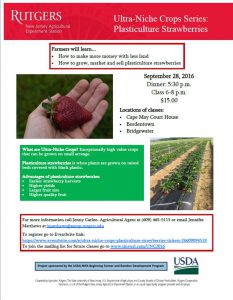Rutgers Cooperative Extension is offering a series of workshops for new and beginning farmers. The series, sponsored by a grant from the USDA-NIFA Beginning Farmer and Rancher Development Program, is part of the Rutgers Ultra-Niche Crops Project. Ultra-Niche Crops are exceptionally high value crops that can be grown on small acreage. The program is geared towards anyone who is interested in making more money off less land. If you are a new or beginning farmer, or an experienced farmer interested in learning about niche crops, then join the mailing list for more information.
The first class on growing and marketing Plasticulture Strawberries will be held on September 28th. More details and registration are now available. To speak with the project director, contact County Agricultural and Resource Management Agent Jenny Carleo by email (ko at rutgers dot edu) or by phone at 609-465-5115 x607.


